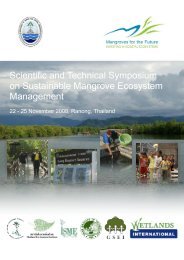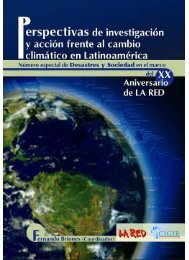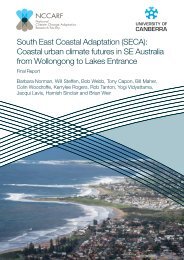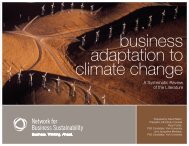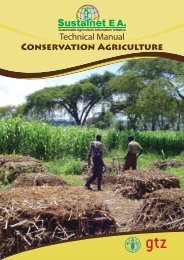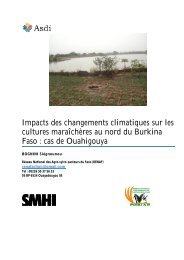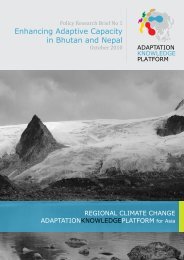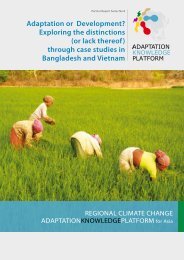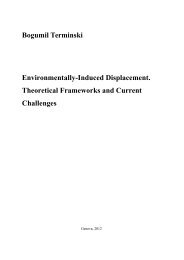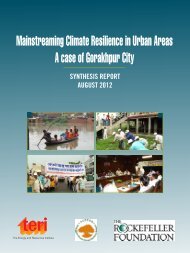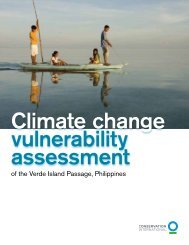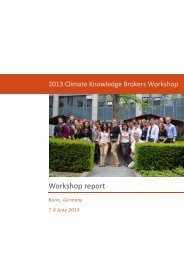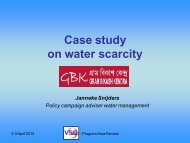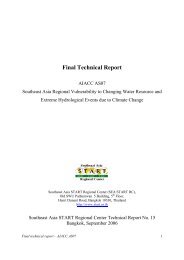5. CONCLUSIONSThere is growing concern about the vulnerability of our cities to a number of factors,including peak oil, global economic crises <strong>and</strong> <strong>climate</strong> <strong>change</strong>. Each of these is likely tohave profound effects on the <strong>security</strong> of <strong>urban</strong> <strong>food</strong> supplies. Recent disasters,especially floods, have highlighted the fragility of <strong>food</strong> supply lines to Australian cities.Experience in the rapidly growing cities of the global south provides vivid illustrations ofthe damaging consequences for social order <strong>and</strong> civility if <strong>food</strong> <strong>security</strong> is seriouslycompromised in anything but the very short term.Most theoretical <strong>and</strong> conceptual work on <strong>food</strong> <strong>security</strong> derives from <strong>and</strong> in manyrespects is most applicable to developing countries <strong>and</strong> to cities in developingcountries. As Australia is not a developing country, the question is: do concepts of <strong>food</strong><strong>security</strong> from developing countries apply to Australia? And if these concepts areapplicable, can they be modified to take account of the particular circumstances of adeveloped country like Australia?This section summarises our findings <strong>and</strong> conclusions under three broad headings:meanings <strong>and</strong> conceptualisations of <strong>food</strong> <strong>security</strong>; the anticipated impacts of <strong>climate</strong><strong>change</strong> on <strong>food</strong> <strong>security</strong>; <strong>and</strong> the contribution of <strong>urban</strong> agriculture to building <strong>urban</strong><strong>resilience</strong>, before closing with a brief discussion of future possibilities.5.1 The concept of <strong>food</strong> <strong>security</strong>Most theoretical <strong>and</strong> conceptual work on <strong>food</strong> <strong>security</strong> derives from <strong>and</strong> in manyrespects is most applicable to developing countries <strong>and</strong> to cities in developingcountries. As Australia is not a developing country, the question is: do these generalconcepts of <strong>food</strong> <strong>security</strong> from developing countries apply readily to Australia? If theseconcepts are applicable, can they be modified to take account of the particularcircumstances of a developed country like Australia?There is growing global concern about the vulnerability of cities to a number ofexistential threats, including peak oil, global economic crises <strong>and</strong> <strong>climate</strong> <strong>change</strong>. Eachof these is likely to have profound effects on <strong>food</strong> <strong>security</strong> in general <strong>and</strong> on the<strong>security</strong> of <strong>food</strong> supplies to cities in particular. Recent disasters, especially floods <strong>and</strong>storms, have highlighted the fragility of <strong>food</strong> supply lines to Australian cities while therapidly growing cities of the global south provide vivid illustrations of the damagingconsequences for social order <strong>and</strong> civility if <strong>food</strong> <strong>security</strong> is seriously compromised inanything but the very short term.Food <strong>security</strong> is typically defined in terms of access to <strong>food</strong> as well as its affordability<strong>and</strong> availability while some also refer to the cultural acceptability of <strong>food</strong> <strong>and</strong> to theagency of institutions promoting greater <strong>food</strong> <strong>security</strong> (FAO, 2006; Ryerson Centre forStudies in Food Security, 2013). But other related concepts are also used increasinglyin policy <strong>and</strong> other debates as a result of criticism of the limited <strong>and</strong> absolutistconception of the FAO approach. Food sovereignty, for example, was introduced bythe International Peasant Farmers’ organisation La Via Campesina in 1996 as anecessary precursor for <strong>food</strong> <strong>security</strong> (Patel 2009) <strong>and</strong> while there is a diversity ofunderst<strong>and</strong>ings of <strong>food</strong> sovereignty, at the heart of most is a rights-based approach<strong>Urban</strong> <strong>food</strong> <strong>security</strong>, <strong>urban</strong> <strong>resilience</strong> <strong>and</strong> <strong>climate</strong> <strong>change</strong> 57
allied to strong notions of autonomy in local <strong>food</strong> systems. In the ground-breakingInternational Assessment of Agricultural Knowledge, Science <strong>and</strong> Technology forDevelopment, <strong>food</strong> sovereignty is defined as ‘the right of peoples <strong>and</strong> sovereign statesto democratically determine their own agricultural <strong>and</strong> <strong>food</strong> policies’ (McIntyre, et al.,2009, p. 111). More than simply about access, <strong>food</strong> sovereignty seeks to maketransparent the power relationships inherent in agricultural <strong>and</strong> <strong>food</strong> systems as aprecursor to changing these into more equitable systems.As more of the world’s population lives in cities, so questions of <strong>food</strong> <strong>security</strong> <strong>and</strong> <strong>food</strong>sovereignty increasingly take on an <strong>urban</strong> dimension. While much debate is concernedwith how to produce enough <strong>food</strong> for a growing <strong>urban</strong> population <strong>and</strong> how to securelines of supply from rural places of production to <strong>urban</strong> places of consumption, greaterattention is now also being paid to the systems of production, processing <strong>and</strong>distribution of <strong>food</strong> within <strong>urban</strong> areas. Recent recognition of the extent of <strong>food</strong> wastage(Institution of Mechanical Engineers, 2013) illustrates that <strong>food</strong> <strong>security</strong> should not belimited, conceptually or practically, to the nature <strong>and</strong> volume of production but extendedto matters of distribution, access <strong>and</strong> control.The production of <strong>food</strong> within <strong>urban</strong> areas is an important component of <strong>urban</strong>agriculture, along with systems of <strong>food</strong> processing, distribution <strong>and</strong> sale. Themanagement of waste from these processes is another important element in this broadconception of <strong>urban</strong> agriculture. There is scope, therefore, for <strong>urban</strong> agriculture tomake an important contribution to strengthening <strong>urban</strong> <strong>food</strong> <strong>security</strong>. This can in turnhelp build <strong>urban</strong> <strong>resilience</strong> <strong>and</strong> promote more sustainable forms of <strong>urban</strong> life.<strong>Urban</strong> <strong>resilience</strong> has entered the lexicon of <strong>urban</strong> studies <strong>and</strong> indeed <strong>urban</strong> policy inrecent years <strong>and</strong> typically takes a broad view of the capacity of cities of respond to orrecover from external threats <strong>and</strong> shocks. Pickett et al.(2004) propose the metaphor of‘resilient cities’ as a means of linking the disciplines of ecology <strong>and</strong> planning into amore productive relationship to better underst<strong>and</strong> some of the major problemsconfronting contemporary cities <strong>and</strong> indeed to propose effective solutions to them.They propose also that the ‘old paradigm’ of ecology based on an equilibrium model isreplaced by a non-equilibrium paradigm which connects structure <strong>and</strong> function in sucha way that <strong>resilience</strong> becomes the ability of a system to adjust in the face of changingconditions rather than simply returning to its previous equilibrium condition after adist<strong>urban</strong>ce. In the context of <strong>urban</strong> <strong>resilience</strong> or the <strong>resilience</strong> of cities this ‘newparadigm’ is especially valuable as the uncritical pursuit of a past condition isunavoidably retrograde <strong>and</strong> almost certainly doomed to failure.In contrast, University College London’s Centre for <strong>Urban</strong> Sustainability <strong>and</strong> Resilienceadopts an engineering focussed view of <strong>resilience</strong> <strong>and</strong> describes it as:a newer concept [than sustainability] dealing with the issue of how to mitigate theeffects of environmental disasters <strong>and</strong> terrorism, incorporating seismic <strong>and</strong>volcanic hazard, flood risk, the spread <strong>and</strong> control of disease, <strong>security</strong> <strong>and</strong>situational awareness (UCL CUSR website: why <strong>urban</strong> sustainability <strong>and</strong><strong>resilience</strong>?).One of the key questions posed at the outset of this review concerns the capacity of<strong>urban</strong> agriculture to play a more prominent role in enhancing <strong>food</strong> <strong>security</strong> <strong>and</strong> hence<strong>Urban</strong> <strong>food</strong> <strong>security</strong>, <strong>urban</strong> <strong>resilience</strong> <strong>and</strong> <strong>climate</strong> <strong>change</strong> 58
- Page 1 and 2:
Synthesis and Integrative ResearchF
- Page 3 and 4:
Published by the National Climate C
- Page 5 and 6:
ABSTRACTFood security is increasing
- Page 7 and 8:
1. a review of the literature: on n
- Page 9 and 10:
its Food for All project. This help
- Page 13 and 14:
In response to the existential thre
- Page 15 and 16: 2. OBJECTIVES OF THE RESEARCHFood i
- Page 17 and 18: debates and to the more systematic
- Page 19 and 20: organisation in the past few years.
- Page 21 and 22: 4. RESULTSIn this section we presen
- Page 23 and 24: increasing productivity. Thus, whil
- Page 25 and 26: people and the origins of their foo
- Page 27 and 28: urban food supply chains. Thus, whi
- Page 29 and 30: This logistics system is dominated
- Page 31 and 32: Like Hodgson et al., as per definit
- Page 33 and 34: esilient, powerful by being locally
- Page 35 and 36: volume or even its contribution to
- Page 37: community food growing can have on
- Page 40 and 41: generations this history has been f
- Page 42 and 43: a stronger focus on addressing the
- Page 44 and 45: The third key aspect is fairness -
- Page 46 and 47: climate (which we live and work in
- Page 48 and 49: agriculture. Eight percent is in ur
- Page 50 and 51: This concept of the ‘spaces in be
- Page 52 and 53: esearch scientist and chair of the
- Page 54 and 55: As discussed above, protection of t
- Page 56: 4.2.5 What is the extent and the im
- Page 60 and 61: no place under the panoply of pract
- Page 62 and 63: increased, the market dominance of
- Page 64 and 65: … the residents of S Park called
- Page 68 and 69: urban resilience. This inevitably c
- Page 70 and 71: In many respects these contrasting
- Page 72 and 73: Many interviewees of both standpoin
- Page 74 and 75: a given area. The rationale for thi
- Page 76 and 77: mapping the location of sources of
- Page 78 and 79: Australian food policy debates refl
- Page 80 and 81: APPENDIX 1: URBAN FOOD SECURITY, UR
- Page 82 and 83: IntroductionGlobally, and in Austra
- Page 84 and 85: Review methodsThis stage of the res
- Page 86 and 87: despite many of the causes of food
- Page 88 and 89: …by 2050… food production will
- Page 90 and 91: 2. How is food security (in general
- Page 92 and 93: the food security of cities, but no
- Page 94 and 95: While some see the density of devel
- Page 96 and 97: when suppliers, distributors, and c
- Page 98 and 99: a more prominent role in enhancing
- Page 100 and 101: community gardens webpage on the Co
- Page 102 and 103: comprehensive description of the ca
- Page 104 and 105: In both the developed and developin
- Page 106 and 107: Their review notes a significant in
- Page 108 and 109: lines of supply from often rural pl
- Page 110 and 111: 1 IntroductionCities have always be
- Page 112 and 113: Despite some attempts to curb urban
- Page 114 and 115: the Gold Coast remains a city that
- Page 116 and 117:
ackyard/community gardenernot affil
- Page 118 and 119:
level in local government. VicHealt
- Page 120:
Figure 2: Impacts on Municipal Food
- Page 125 and 126:
security I recognise that the cost
- Page 127 and 128:
United States, he offered the follo
- Page 129 and 130:
This vision highlights the multi-fu
- Page 131 and 132:
An environmental education centre.
- Page 133 and 134:
Melbourne Food ForestA Melbourne ga
- Page 135 and 136:
stakeholder consultations, the repo
- Page 137 and 138:
can. We sense the changes. The earl
- Page 139 and 140:
half-desert environments. We’re g
- Page 141 and 142:
etain its basic function and struct
- Page 143 and 144:
government; and that trying to get
- Page 145 and 146:
the north and the west, where it wo
- Page 147 and 148:
Why do people buy so much food that
- Page 149 and 150:
urban agriculture (however broadly
- Page 151 and 152:
enefits and risks. Before we can co
- Page 153 and 154:
Another important and tangible role
- Page 155 and 156:
coast without any problems whatsoev
- Page 157 and 158:
BIBLIOGRAPHYAECOM (2011) Scoping St
- Page 159 and 160:
Burns, C. I., A. (2007). Measuring
- Page 161 and 162:
Edwards, F., & Mercer, D. (2010). M
- Page 163 and 164:
James, S. O’Neill, P. and Dimeski
- Page 165 and 166:
Millar, R., 2012, ‘Government shi
- Page 167 and 168:
Saltmarsh, N. M., J; Longhurst, N.
- Page 169 and 170:
Walker B., 2008, Resilience Thinkin



